高三英语 2013-2014学年度第一学期第一学段模块考试一卷
高中英语真题-2013-2014学年度高三第一次检测考试试题
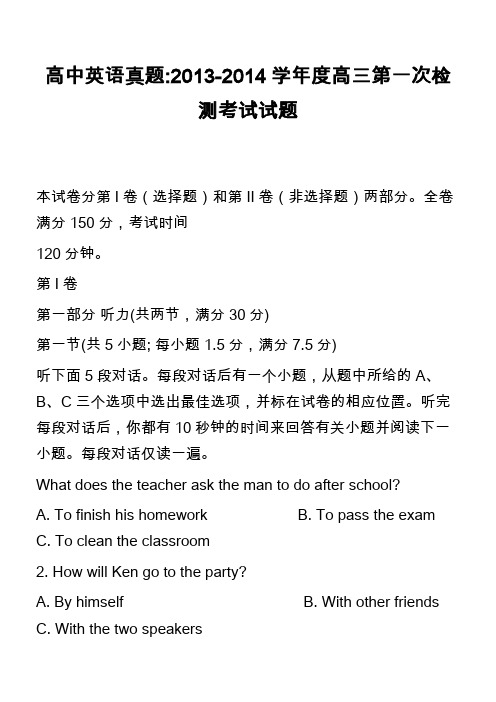
高中英语真题:2013-2014学年度高三第一次检测考试试题本试卷分第I卷(选择题)和第II卷(非选择题)两部分。
全卷满分150分,考试时间120分钟。
第I卷第一部分听力(共两节,满分30分)第一节(共5小题; 每小题1.5分,满分7.5分)听下面5段对话。
每段对话后有一个小题,从题中所给的A、B、C三个选项中选出最佳选项,并标在试卷的相应位置。
听完每段对话后,你都有10秒钟的时间来回答有关小题并阅读下一小题。
每段对话仅读一遍。
What does the teacher ask the man to do after school?A. To finish his homeworkB. To pass the examC. To clean the classroom2. How will Ken go to the party?A. By himselfB. With other friendsC. With the two speakers3. What does the woman think of David?A. He is lazyB. He has a highly effective scheduleC. He often sleeps at work4. What will the woman do in the afternoon?A. Go to the cinemaB. Take an examC. Have classes5. What’s the most probable relationship between the two spea kers?A. Husband and wifeB. Father and daughterC. Doctor and patient第二节(共15小题;每小题1.5分,满分22.5分)听下面5段对话或独白。
每段对话或独白后有几个小题,从题中所给的A、B、C三个选项中选出最佳选项,并标在试卷的相应位置。
2013-2014学年度上学期期终考试高三英语试题
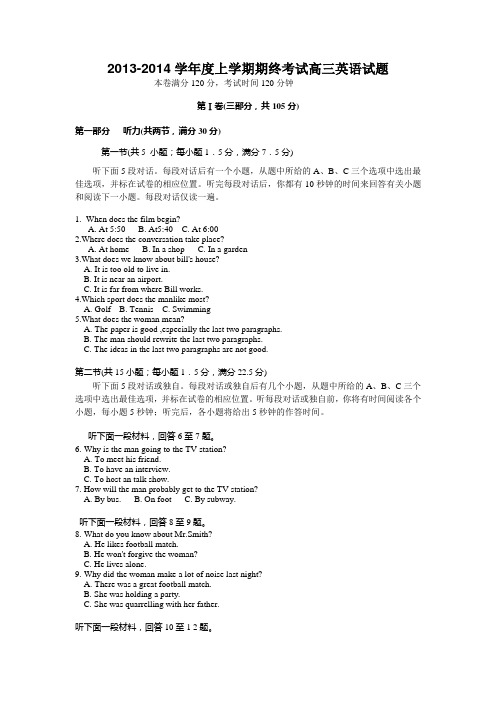
2013-2014学年度上学期期终考试高三英语试题本卷满分120分,考试时间120分钟第Ⅰ卷(三部分,共105分)第一部分听力(共两节,满分30分)第一节(共5 小题;每小题1.5分,满分7.5分)听下面5段对话。
每段对话后有一个小题,从题中所给的A、B、C三个选项中选出最佳选项,并标在试卷的相应位置。
听完每段对话后,你都有10秒钟的时间来回答有关小题和阅读下一小题。
每段对话仅读一遍。
1. When does the film begin?A. At 5:50B. At5:40C. At 6:002.Where does the conversation take place?A. At homeB. In a shopC. In a garden3.What does we know about bill's house?A.It is too old to live in.B.It is near an airport.C.It is far from where Bill works.4.Which sport does the manlike most?A.GolfB. TennisC. Swimming5.What does the woman mean?A.The paper is good ,especially the last two paragraphs.B.The man should rewrite the last two paragraphs.C.The ideas in the last two paragraphs are not good.第二节(共15小题;每小题1.5分,满分22.5分)听下面5段对话或独自。
每段对话或独自后有几个小题,从题中所给的A、B、C三个选项中选出最佳选项,并标在试卷的相应位置。
听每段对话或独自前,你将有时间阅读各个小题,每小题5秒钟;听完后,各小题将给出5秒钟的作答时间。
2013-2014学年高三英语第一学期期末试题
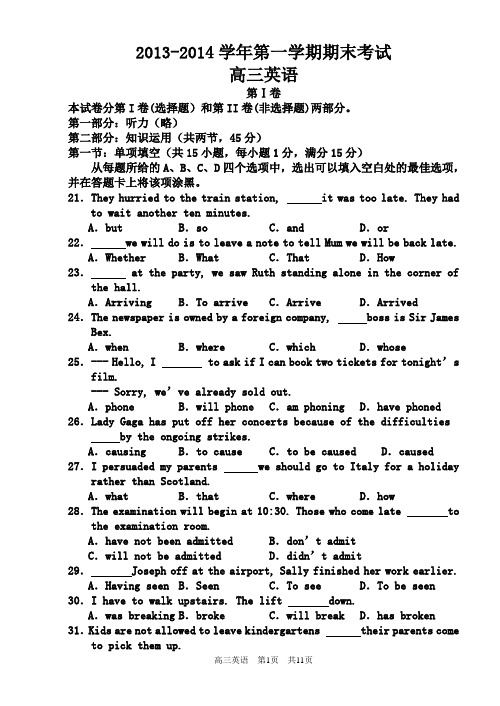
2013-2014学年第一学期期末考试高三英语第Ⅰ卷本试卷分第I卷(选择题)和第II卷(非选择题)两部分。
第一部分:听力(略)第二部分:知识运用(共两节,45分)第一节:单项填空(共15小题,每小题1分,满分15分)从每题所给的A、B、C、D四个选项中,选出可以填入空白处的最佳选项,并在答题卡上将该项涂黑。
21.They hurried to the train station, it was too late. They had to wait another ten minutes.A.but B.so C.and D.or22. we will do is to leave a note to tell Mum we will be back late.A.Whether B.What C.That D.How23. at the party, we saw Ruth standing alone in the corner of the hall.A.Arriving B.To arrive C.Arrive D.Arrived 24.The newspaper is owned by a foreign company, boss is Sir James Bex.A.when B.where C.which D.whose25.--- Hello, I to ask if I can book two tickets for tonight’s film.--- Sorry, we’ve already sold out.A.phone B.will phone C.am phoning D.have phoned 26.Lady Gaga has put off her concerts because of the difficultiesby the ongoing strikes.A.causing B.to cause C.to be caused D.caused27.I persuaded my parents we should go to Italy for a holiday rather than Scotland.A.what B.that C.where D.how28.The examination will begin at 10:30. Those who come late to the examination room.A.have not been admitted B.don’t admitC.will not be admitted D.didn’t admit29. Joseph off at the airport, Sally finished her work earlier.A.Having seen B.Seen C.To see D.To be seen 30.I have to walk upstairs. The lift down.A.was breaking B.broke C.will break D.has broken 31.Kids are not allowed to leave kindergartens their parents come to pick them up.A.since B.unless C.although D.because32.For the engine to work, the green button be in the “on”position.A.can B.would C.must D.might33.The Christmas gifts need to be ready next Friday.A.by B.of C.in D.at34.If we sit near front of the bus, we’ll have better view.A.不填;the B.the; 不填C.a; the D.the; a 35.Cathy went to the hospital alone. If she had told me about it, I with her.A.had gone B.would have gone C.would go D.went第二节:完型填空(共20小题;每小题1.5分,满分30分)阅读下面短文,掌握其大意,然后从36—55各题所给的四个选项(A、B、C和D)中,选出最佳选项He met her at a party. She was outstanding; many boys were after her, but nobody paid any 36 to him. After the party, he invited her for coffee. She was surprised. In order not to 37 rude, she went along.38 they sat in a nice coffee shop, he was too 39 to say anything. Suddenly, he asked the waiter. “Could you please 40 me some salt? I’d like to put it in my coffee.”The girl stared at him. He turned red, but when the salt came, he put it in his coffee and drank. 41 , she asked. “Why salt with coffee?” he 42 , “When I was a little boy. I lived near the sea,I liked playing in the sea…I could 43 its taste salty, like salty coffee. Now every time I drink it. I think of my 44 and my hometown.I miss it and my parents, who are still there.”She was deeply 45 , A man who can 46 that he’s homesick, must love his home and 47 about his family. He must be 48 .She talked too, about her faraway hometown, her childhood, her 49 . That was the start of their love story.They continued to date each other. She found that he met all her 50 . He was tolerate, kind, warm and careful. 51 to think she would have missed the 52 if not for the salty coffee!So they married and lived happily together. Every time she made coffee for him, she put in some salt, the 53 he liked it.After 40 years, he 54 away and left her a letter which said: “My dearest, please forgive my life–long lie. Remember the first time we dated? I was so nervous I asked for salt instead of sugar. If I could live a second time, I hope we can be together again, 55 it meansthat I have to drink salty coffee for the rest of my life.”36.A.money B.attention C.visit D.respect 37.A.show B.look C.seem D.appear 38.A.As B.Because C.Since D.Though 39.A.eager B.proud C.nervous D.anxious 40.A.lift B.take C.carry D.bring 41.A.Mysterious B.Moved C.Curious D.Excited 42.A.explained B.argued C.stated D.claimed 43.A.taste B.feel C.smell D.sense 44.A.boat B.friend C.playmate D.childhood 45.A.touched B.hurt C.pressed D.interested 46.A.afford B.realize C.recognize D.admit 47.A.mind B.care C.know D.attend 48.A.smart B.intelligent C.responsible D.flexible 49.A.family B.school C.relatives D.house 50.A.friends B.requirements C.needs D.standards 51.A.And B.When C.Or D.But 52.A.sight B.train C.catch D.home 53.A.method B.style C.manner D.way 54.A.moved B.passed C.died D.walked 55.A.as if B.now that C.even if D.so that第三部分阅读理解(共两节,满分40分)第一节(共15小题:每小题2分,满分30分)阅读下列短文,从每题所给的四个选项(A. B. C和D)中,选出最佳选项,并在答题卡上将该项涂黑·AFrom the beginning rivers have played an important role in the life of man.Man of the earliest times used the rivers as a means of travel.Today rivers still serve as a great waterway for the transport and people.In ancient times, man settled near rivers or on river banks and built up large empires.Water is nature’s most valuable gift to man.Man needs water to irrigate his crops, to cook and to wash.In nations all over the world, rivers mean life and wealth.They feed and clothe the nations around them.Water is also a source of energy and power.Man build huge dams across the rivers to control the water for irrigation and get the energy needed to drive generators.The electrical power is then directed to homes, cities, factories and television stations.Man uses water each day.In a small way rivers help to keep man in good health and provide for his amusements.Various forms of water sportskeep man strong and healthy.56.Rivers have been important to man _______.A.since the last century B.since they came into being C.since a few hundred years ago. D.since the beginning of BC 57.Man in old times traveled from one continent to another ______.A.by sea B.by air C.by train D.by bus 58.Generators are machines that are used ______.A.to direct electrical power B.to control the waterC.to build dams D.to produce electricity 59.Which of the following statements is true?A.People get energy by building bridges across rivers.B.In ancient times large empires grew up near dams.C.Large rivers are still useful for transportation in modern times. D.People can be provided with amusements in small rivers.BSome time ago ,I discovered that one of my chairs had a broken leg.I didn’t think there would be any difficulty in getting it mended ,as there are a whole lot of antique(古董)shops near my home. So I left home one morning carrying the chair with me. I went into the first shop expecting a friendly reception(接待). I was quite wrong. The man wouldn't over look at my chair.The second shop, though slightly more polite, was just the same, and the third and the fourth - so I decided that my approach must be wrong.I went into the fifth shop with a plan in my mind. I placed the chair on the floor and said to the shopkeeper,“ Would you like to buy a chair?” He looked it over carefully and said,“ Yes, not a bad chair. How much do you want for it, sir?” “Twenty pounds,”I said. “OK, ”he said, “I’ll give you twenty pounds. ”“It’s got a slightly broken leg,”I said. “Yes, I saw that, it's nothing.”Everything was going according to plan and I was getting excited. “What will you do with it?”I asked. “Oh, it will be easy to sell once the repair is done. ”“I'll buy it,”I said. “What do you mean?You’ve just sold it to me,”he said. “Yes, I know but I’ve changed my mind. I'm sorry, I'll give you twenty -seven pounds for it. ”“ You must be crazy, ”he said. Then, suddenly the penny dropped. “I know what you want. You want me to repair your chair. ”“ You’re right, ”I said. “And what would you have done if I had walked in and said, “Would you mend this chair for me?”“I wouldn't have agreed to do it,” he said. “We don’t do repai rs, not enough money in it and too much trouble. But I’ll mend this f or you, shall we say for five pounds?” He was avery nice man and was greatly amused(感到有趣)by the whole thing. 60.We can learn from the text that in the first shop the writer ________.A. was rather impoliteB. was warmly receivedC. asked the shopkeeper to buy his chairD. asked the shopkeeper to repair his chair61.The expression “the penny dropped” in the last paragraph means the shopkeeper ________.A. changed his mindB. accepted the offerC. saw the writer’s purposeD. decided to help the writer 62.How much did the writer pay?A. £ 5.B. £ 7.C. £ 20.D. £ 27. 63.From the text, we can learn that the writer was ________A. honestB. carefulC. smartD. funnyCRecently, a couple in New Zealand were forbidden from naming their baby son 4Real. Even though New Zealand has quite liberal (开明的) rules about naming children, names beginning with a number are not allowed. They decided to call him Superman instead.In many countries around the world, unusual names for children are becoming more popular, especially since the increasing trend for famous people to give their children special names. In Britain, you can call a child almost anything you like — the only restrictions on parents relate to offensive words.Some parents choose names which come from popular cultures. For example, there have been six boys named Gandalf after the character in the Lord of the Rings novels and films. Equally, names relating to sports are fairly common — since 1984, 36 children have been called Arsenal after the football team. Other parents like to make up names, or combine names to make their own unique version, a method demonstrated by Jordan, the British model, who recently invented the name Tiáamii for her daughter by combining the names Thea and Amy (the two grandmothers).In Britain, some names which were previously thought of as old-fashioned have become more popular again, such as Maisie or Ella for a girl, or Alfie or Noah for a boy. But the most popular names are not the wacky ones. The top names are fairly traditional —Jack, Charlie and Thomas for boys and Grace, Ruby and Jessica for girls.Other countries have much stricter rules when it comes to naming children. Countries including Japan, Denmark, Spain and Germany have an approved list of names from which parents must choose.64. According to the text, we can know that _______.A. traditional names are favored by famous peopleB. unusual names are becoming more popular in the worldC. naming rules in different countries are nearly the sameD. special names are often made up by common people65. What does the underlined word “wacky” in Paragraph 4 probably mean?A. Special and difficult.B. Funny and stupid.C. Strange and unusual.D. Interesting and inspiring.66. What is the text mainly about?A. How to give children special names.B. Unusual names in the world.C. Naming rules in the world.D. Strange names and traditional ones.DA “blogger” is a person who writes on an Internet computer web site called a “blog”.The word “blog” is a short way of saying web log(日志), or personal web site.Anyone can start a blog, and they can write about anything they like.There are millions of blogs on the Internet today.They provide news, information and ideas to many people who read them.They contain links to other web sites.And they provide a place for people to write their ideas and react to the ideas of others.A research company called Perseus has studied more than 3,000 web logs.It says that blogs are most popular with teenage girls.They use them to let their friends know what is happening in their life.The study also says that more than 100,000 bloggers stopped taking part in the activity after a year.However, some people develop serious blogs to present political and other ideas.For example, the Republican and Democratic parties in the southern state of Kentucky recently started their own blogs.And American companies are beginning to use blogs to advertise their products.At the same time, some long-standing blogs have ended.Last week, blogging leader Dave Winer closed his free blog service, weblogs.com.He says the site became too costly to continue.He started the blog four years ago, and thousands of people had written on it.One blog that is still going strong is called Rebecca’s Pocket.It involves(包括) much useful information for readers.Rebecca Blood created the web site in 1999.She wrote about the history of blogs on the site.That article led to a book called “The Weblog Handbook”.It has been translated into four languages so far.Ms Blood says Rebecca’s Pocket gets about 30,000 visitors a month.She writes about anything and everything----politics, culture and movies.She recently provided medical advice.And she wrote about how to prevent people from stealing money from online bank accounts.67.The text is written mainly to _____A.introduce an Internet computer web site called “blog”B.introduce a way of reading on blogs.C.tell readers about blogs.D.tell readers how to write blogs68.From the text we can learn that blogs cover almost everything except ____.A.different ideas B.medical adviceC.advertisements D.account codes69.According to this passage, which of the following is NOT true?A.Politicians don’t use blogs at allB.A lot of bloggers no longer write or read blogsC.Those who like to use blogs are mostly teenage girlsD.Dave Winer closed his “weblogs.com” because of money shortage 70.The reason why Rebecca’s Pocket is still going strong is that_____ A.it was created by a womanB.it provides plenty of useful information and adviceC.it is about the history of booksD.it has editions in at least four different languages第二节(共5小题;每小题2分,满分10分)根据短文内容,从短文后的选项中选出能填入空白处的最佳选项。
高中英语真题-2013—2014年第一学期期末考试_1
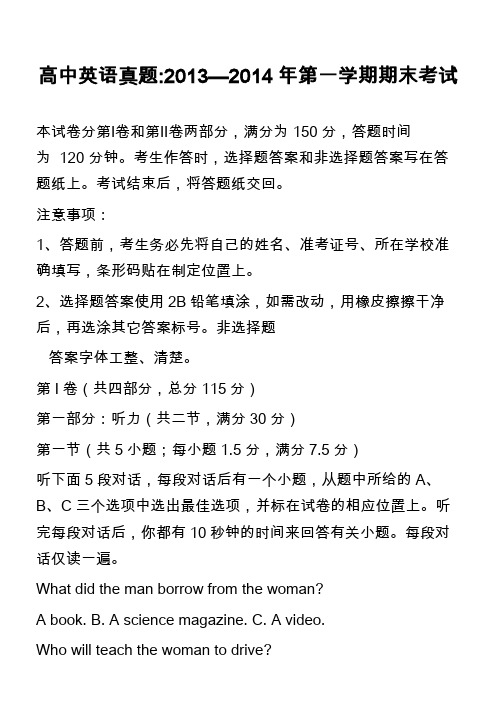
高中英语真题:2013—2014年第一学期期末考试本试卷分第Ⅰ卷和第Ⅱ卷两部分,满分为 150分,答题时间为 120 分钟。
考生作答时,选择题答案和非选择题答案写在答题纸上。
考试结束后,将答题纸交回。
注意事项:1、答题前,考生务必先将自己的姓名、准考证号、所在学校准确填写,条形码贴在制定位置上。
2、选择题答案使用2B铅笔填涂,如需改动,用橡皮擦擦干净后,再选涂其它答案标号。
非选择题答案字体工整、清楚。
第I卷(共四部分,总分115分)第一部分:听力(共二节,满分30分)第一节(共5小题;每小题1.5分,满分7.5分)听下面5段对话,每段对话后有一个小题,从题中所给的A、B、C三个选项中选出最佳选项,并标在试卷的相应位置上。
听完每段对话后,你都有10秒钟的时间来回答有关小题。
每段对话仅读一遍。
What did the man borrow from the woman?A book. B. A science magazine. C. A video.Who will teach the woman to drive?Her coach. B. Her mother. C. Her father.What will the speakers probably do today?Go swimming. B. Hike in the mountain. C. Have a walk.How does the woman feel about her child’s performance?It was perfect. B. It could be better. C. It was too difficult for her child.Where does the conversation take place?A. At the library.B. At a bookstore.C. In a theater.第二节(共15小题,每小题1.5分,满分22.5分)听下面5段对话或独白,每段对话或读白后有几个小题,从所给的A. B. C.三个选项中选出最佳选项,并标在试卷的相应位置。
高中英语真题-2013-2014学年度第一学期_1
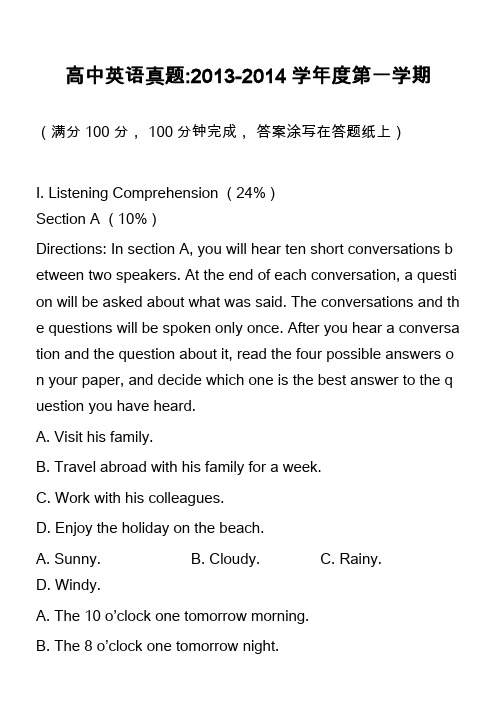
高中英语真题:2013-2014学年度第一学期(满分100 分, 100分钟完成,答案涂写在答题纸上)I. Listening Comprehension ( 24% )Section A ( 10% )Directions: In section A, you will hear ten short conversations b etween two speakers. At the end of each conversation, a questi on will be asked about what was said. The conversations and th e questions will be spoken only once. After you hear a conversa tion and the question about it, read the four possible answers o n your paper, and decide which one is the best answer to the q uestion you have heard.A. Visit his family.B. Travel abroad with his family for a week.C. Work with his colleagues.D. Enjoy the holiday on the beach.A. Sunny.B. Cloudy.C. Rainy.D. Windy.A. The 10 o’clock one tomorrow morning.B. The 8 o’clock one tomorrow night.C. The 10 o’clock one tomorrow night.D. The 8 o’clock one tomorrow morning.A. A tour around .B. Whistling in .C. Visiting .D. Holiday plans.A. By air.B. By bus.C. By car.D. By train.A. At a restaurant.B. On a plane.C. In a cafeteria.D. At the airport.A. To .B. To .C. To .D. To .A. 8:15.B. 4:15.C. 12:15.D. 16:15.A. Friends.B. Husband and wife.C. Classmates.D. Teacher and student.A. The people.B. The scenery.C. The air.D. The modern buildings.Section B ( 6% )Directions: In section B, you will hear two short passages, and y ou will be asked three questions on each of the passages. Thepassage will be read twice, but the questions will be spoken onl y once. When you hear a question, read the four possible answ ers on your paper and decide which one would be the best ans wer to the question you have heard.Question 11 through 13 are based on the following introduction.A. A dramatist.B. A poet.C. A writer.D. All the above.A. Painted cloths.B. Brightly colored fabrics.C. A beautiful park.D. Replicas.A. Around 160 years.B. Over 250 years.C. Over 350 years.D. About 450 years. Question 14 through 16 are based on the following speech.A. Angkor Wat is one of the most fascinating places in the world .B. Angkor Wat was built in honor of Khmer kings.C. Angkor Wat was re-discovered by a Chinese about 150 years ago.D. Angkor Wat is ready to become one of the most visited arch aeological sites.A. 150 years.B. 400 years.C. 1,500 years.D. 4,000 years.A. Siem Reap.B. .C. .D. .Section C ( 8% )Directions: In section C, you will hear two longer conversations. The conversations will be read twice. After you hear each conv ersation, you are required to fill in the numbered blanks with the information you have heard. Write your answers on your answ er sheet.Blanks 17 through 20 are based on the following conversation.Complete the form. Write ONE WORD for each answer. Blanks 21 through 24 are based on the following conversation.Complete the form. Write NO MORE THAN THREE WORDS fo r each answer.II. Grammar and Vocabulary ( 23% )Section A ( 14% )Directions: Beneath each of the following sentences there are f our choices marked A, B, C and D. Choose the one answer that best completes the sentence.--- Where have you been all the time? The plane is about to depa rt.--- I’m so sorry, but I ________ you ________ at the information de sk.A. thought, wereB. am thinking, wereC. think, areD. have thought, have been We can spare some time to ________ local artists at work at the Alaska Indian Arts center.A. celebrateB. commentC. obeyD. observeMost developers reserve the right to ________ a property which they think is virtually unsaleable.A. turn inB. turn downC. turn onD. turn offOnce environmental damage ________ by animals or plants fro m foreign lands, it takes many years for the existing system to r ecover.A. had been doneB. will be doneC. is being doneD. is doneDuring the day, when he ________ to other passengers, he woul d sit on deck, looking out at sea through a telescope.A. doesn’t talkB. hadn’t talkedC. wasn’t talkingD. hadn’t been talkingThis is the time when players can ________ ideas about the stre ngths and weaknesses of opponents and establish a few operat ional rules.A. returnB. changeC. exchangeD. switchAn essay is usually ________ the introduction, the main body, w hich mainly consists of the supporting evidence, and the conclu sion.A. made up ofB. made ofC. made fromD. made out ofWe haven’t reached the summit yet, but we ________ with a littl e bit of luck and a lot of determination.A. willB. have hadC. wouldD. would haveMore than 750 commercial airliners ________ fatal accidents las t year. Added to that were the 1,550 smaller aircraft.A. involved inB. were involved ofC. were involved inD. involved ofI ________ the death penalty as a violent and evil punishment th at weakens the legal foundations of society.A. thinkB. supposeC. believeD. regard--- They ________ next door. Terribly noisy, isn’t it?--- Yes, that house keeps changing hands and the new owner al ways begins by putting in a new fireplace, which is just on the o ther side of this wall, so we ________ everything.A. always hammer, are hearingB. are always hammering, hearC. have always hammered, heardD. always hammered, were hearingLi Na, the first Chinese player to win a grand slam singles title, ________ another famous first to her collection when she ______ __ the semifinals of the season-ending WTA Championships in Istanbul with a 6-2, 6-1 victory over Victoria Azarenka yesterday.A. has added, has reachedB. was adding, reachedC. added, reachedD. added, was reachingEstimates of the amount of oil spilled into the Gulf during the wa r ________, but a reasonable guess of around 4 million barrels i s about twice the “________” annual pollution from oil wells and tankers.A. change, naturalB. range, standardC. vary, normalD. adjust, regularA Chinese journalist arrested over a series of articles criticizing a partly state-owned firm ________ on state television yesterday ________, sa ying he ________ the articles were unverified and false.A. to appear, apologized, had admittedB. was appeared, apologizing, was admittingC. appeared, to apologize, admittedD. was appearing, apologized, would admitSection B ( 9% )Directions: Complete the following passage by using the words in the box. Each word can only be used once. Note that there is one word more than you need.Every guide book would recommend some must-see tourist attractions. However, some of the most _____39_____ sites can also be the most disappointing. Maybe it’s not that t hese places are not mind-blowing --- it’s just that they have been given so much hype (夸大的宣传) for being spectacular that we _____40_____ unreal images i n our own minds. The top spots on the list of disappointing touri st attractions, according to tourists’ votes, are taken by these sit es:Called the “Iron Lady,” the Eiffel Tower is _____41_____ one of t he most prominent symbols of . Built in 1889, the Eiffel Tower is the tallest building in and the most visited tourist attraction in t he world, attracting about seven million tourists a year, 75 perc ent of them being foreigners. But hours of waiting in line to go u p the tower alone is frustrating enough to kill the pleasure for ev en the most _____42_____ tourist. And the ticket is overpriced, t ourists say.The Louvre’s Mona LisaWhen Leonardo da Vinci painted the portrait of a shy-looking smiling woman in the 16th century, he must have had n o idea about what _____43_____ people in the 21st century wou ld have to undergo to see the painting. No tourist to Paris would want to miss the Mona Lisa, displayed at the magnificent Louvr e in . As a result, the room where the painting is _____44_____ i s usually totally crowded, making it difficult to even get a glimps e of the famous painting.Statue ofAlthough it has long been an icon of , the Statue of Liberty is, s ome say, a(n) _____45_____ monument, at least when it is clos ed for extensive _____46_____ related to safety measures. Duri ng these times, tourists can reach the island of freedom but are not allowed to climb into the crown. The repairs, costing about $ 28 million, were completed for the 126th anniversary of its open ing on October 28, 2012. Until then, tourists can only take some _____47_____ at the base of the statue but the statue itself may remain outside their visit.III. Reading. Comprehension ( 30% )Section A ( 15% )Directions: For each blank in the following passage there are fo ur words or phrases marked A, B, C and D. Fill in each blank wi th the word or phrase that best fits the context.A long time ago a baby was born into a poor family. His future l ooked _____48_____ as he grew to see a poor life before him. H e joined the army as a common soldier and was wounded so __ ___49_____ that he never regained the use of his left arm.He later failed to find a good job and, on two _____50_____, wa s sent to debtor’s prison. He continued to brush aside the law a nd struggled just to _____51_____.But, despite his poor life, he never let go of his _____52_____ to write a book. He wrote a beautiful story which came from his h eart’s deepest dreams and desires. It has _____53_____ genera tions of people the world over ever since. It is about a man who saw the world _____54_____ from everyone else. Though writte n in _____55_____, the book is an encouraging tale of irrepressi ble (压抑不住的) _____56_____. This man’s story has been put to music and film, translated into numerous languages and remains a bestsell er after some 400 years. The _____57_____ was Miguel de Cer vantes Saavedra (塞万提斯) and the book is Don Quixote de la Mancha (《堂吉诃德》). Perhaps Cervantes himself believed that the world “sees perso ns as they are --- I see them as they can be!” Cervantes may never have _____5 8_____ such a good work had he not seen some potential within himself that was _____59_____ from the rest of the world. He h as taught others that great _____60_____: What we see will com e to be.Some see themselves as they are, others as they _____61____ _ be. But when we look beyond the present reality, sad as it ma y seem, and _____62_____ our sights upon the best that is withi n a situation or a human being, then, too, what we see will com e to be. And we’ll know the power of hope.48 .A.sadB.rosyC.brightD.sunny49 .A.terriblyB.heavilyC.hardlyD.seriously50 .A.conditionsB.circumstancesC.situationsD.occasions51 .A.surviveB.succeedC.wanderD.contribute52 .A.trustB.destinationC.loveD.dream53 .A.boredB.movedC.untiedD.frightened54 .A.differentlyB.authenticallyC.brilliantlyD.clearly55 .A.angerB.troubleC.dangerD.suffering56 .A.riskB.adventureC.hopeD.emotion57 .A.authorB.soldierC.translatorD.debtor58 .A.continuedB.performedC.foundD.finished59 .A.realizedB.developedC.hiddenD.tapped60 .A.truthB.proverbC.mottoD.saying61. A . wouldB . canC . mayD . must62. A . devote B .fasten C .pay D .fixSection B ( 15% )Directions: Read the following four passages. Each passage is f ollowed by several questions or unfinished statements. For eac h of them there are four choices marked A, B, C and D. Choose the one that fits best according to the information given in the p assage you have just read. ( A )Microsoft founder Bill Gates, 57, has found himself at the center of a cultural row since April 22. It all started with a handshake with ’s President Park Geyn-hye, 61, during Gates’ visit to the country. Gates has been accu sed (指责) of disrespecting (不尊重) Park after he was pictured shaking hands with her with his left hand in his pocket.“Disrespectful handshake or casual (随意的) handshake?” asked South Korea’s largest newspaper, the K ong-A Ilbo. Similarly, the Joongang Ilbo newspaper asked: “Cultural difference or bad manners?”“Perhaps it was his all-American style, but an open jacket with a hand in his pocket? T hat was way too casual. It was very regretful,” Chung Jin-suk, secretary general at ’s National Assembly, told ABC News. In Asian countries, a one-hand shake is very causal, used only when the other party is a good friend, of the same age or younger age. Using one hand with the other in the pants pocket is considered rude, often an e xpression of superiority toward the other.This isn’t the first time Gates has broken the country’s social rul es. According to AFP, Gates used a similarly casual hand shak e in 2008 with Park’s predecessor (前任) Lee Myung-bak. However, a picture from 2001 showed him giving a two-handed shake to then president Kim Dae-jung.Some South Korean media have said that it may have been on purpose, showing his political preferences --- respect for the opposition (反对党) leader Kim but disrespect for the ruling party leaders Lee an d Park.“Gates is a casual man who’s not bound (束缚) by customs so he shakes hands in this manner even when meeting heads of international organizations or top political figu res (人物),” Dong-A Ilbo quoted an unnamed friend of Gates’ in Seoul as saying. What is the article mainly about?How to shake hands with people.Rules for shaking hands in different countries.The recent discussion about handshake manners.Gates’ disrespectful behaviour shows his political preferences. What does the underlined word “superiority” mean?a proud attitudean uncertain feelinga positive attitudea feeling of dislikeWe can infer from the article that ____________________. South Koreans think that it’s Gates’ right to shake hands how h e wants toSouth Koreans think that it’s improper for Gates to give a one-hand shakethe author suggests that readers be careful when shaking hand sit is very common for Asian people to give one-hand shakes( B )To many outside of Asia and the fashion circles, Fan Bingbing i s largely unheard of. That is changing with her inclusion in last year’s Vanity Fair’s (《名利场》) Best-Dressed List, and leading the latest Forbes China’s top celebrit y list.A superstar in China and arguably the reigning queen of the red carpet at the Cannes Film Festival, Fan Bingbing is perhaps m ore famous in America and Europe for her glamorous and risk-taking style than her movies. For example, at the premiere of th e movie Moonrise Kingdom, she wore a colorful strapless (无带的) gown with a bird and branch theme that rendered (表现) her like a porcelain vase from the Tang dynasty. Fan Bingbi ng has a love for fashions that are elegant and conceptual (概念的) at the same time. She has an individual look and she is fearl ess in her choices.Unlike many of her Hollywood counterparts who wear runway lo oks exactly like those shown on the catwalk, Fan Bingbing kno ws how to inject an element of surprise into her ensembles (成套服装), whether it’s through an imaginative turban (头巾) or through her variable hairstyles. In fact, her hairdos chang e with her every ensemble, going from classic chignon (发髻) at one event to wild and curly at another. She also likes to a dd a touch of old world Shanghai to a Louis Vuitton (路易威登) ensemble or rock-the-80s look with a Versace (范思哲) dress.She glides from glamorous fashion to unique dressing with eas e and confidence, which is why many have likened her ever-changing style to that of Lady Gaga. She has fun with fashion a nd she is not afraid to take chances, which is why her clothes ar e often noticed and critiqued by many style blogs, calling her on e of the most dynamic (充满活力的) dressers on the red carpet. With the nod from Vanity Fair, we might expect to see more of Fan Bingbing at future red carpet events.Outside Asia, Fan Bingbing is mostly famous for _____________ _______.her delivery of speechher graceful appearanceher glamorous and risk-taking styleher outstanding performance in moviesWhich is NOT among the possible ways Fang Bingbing may dr ess herself on the red carpet?By carrying unique bags.By using an imaginative turban.By combining Chinese elements with Western-style dresses. By wearing variable hairstyles that go with her ensembles. Why is Fan Bingbing called one of the most dynamic dressers o n the red carpet?Because she often designs red-carpet dresses by herself. Because she offers many other actresses fashion advice. Because she is creative about dressing and is willing to try new styles.Because she is often the one wearing the strangest dress on th e red carpet.What influence may be caused by Fan Bingbing’s inclusion in Vanity Fair’s list?Her dressing styles may change in the future.She may perform in some Hollywood movies.She may get more opportunities to perform in new movies.She may wear more glamorous dresses at red carpet events.( C )Brussels is home to the North Atlantic Treaty Organization (NA TO北约), the European Union and countless priceless works of art. B ut for promotion, the Belgian capital turns to a tiny peeing boy.The Manneken Pis (“撒尿小童”像), one of Brussels’ most recognizable statues, has been an e ssential tourist stop for centuries. Its exact origin is unknown bu t there are several legends behind the statue, the most famous being a boy named Julianske urinating on a burning fuse (导火索) and thus saving the city.The 15th-century urinating sculpture is also an icon for locals. “Our symb ol is only 61-cm tall and he’s peeing,” said Martha Meeze, a spokeswoman f or Visit Brussels, the ci ty’s tourist office. In , she said, “We don’t take ourselves too seriously.”Now, the statue is getting into marketing. He appears in logos a nd ads. Replicas of him, once mainly sold around Brussels as c orkscrews (红酒开瓶器) and in snow globes, are now also cast in colourful chocolate and as lollipops.When city officials wanted to promote a job-creation plan in 2005, they used ads depicting an office full of M annekens at computers and in meetings. Another poster showe d a construction site bustling with Mannekens in hard hats. Pro motions for the annual Brussels Summer Festival include the M annken playing an electric guitar.Even giant Coca-Cola Co. has gone with the flow. Colourful art on Coke vending machines at features the iconic boy standing atop the iconic b ottle. “Manneken Pis is one of our national symbols,” says a Bel gian Coke spokeswoman. She notes that Coke kept the images , installed in 2007, even after it changed worldwide ad campaigns two years later.Brussels doesn’t lack potential icons. It recently renovated the c enterpiece of its 1958 World’s Fair, a giant construction of tubes and silver spheres called the Atomium (原子塔). And the EU’s expanding headquarters complex has led so me to call Brussels “Europe’s Capital.” But neither means so m uch to the Belgian public as the Manneken Pis does. “The Man nken Pis is like the Eiffel Tower for Paris,” says Bérengère de L aveleye, of the Brussels City Museum. “It’s just smaller and mor e fun.”Brussels residents see the Manneken Pis as an icon as it _____ _______________.attracts tourists to the Belgian capitalhas a bunch of legends associated with itshows they don’t take themselves too seriouslyis a popular image in advertisingAll of the following statements are true about the Manneken Pis except that ____________________.it was created in the 1400sit is now cast in candyit has been used to promote the EUit means more to the Belgian public than the AtomiumWhat does it mean that Coca-Cola Co. has “gone with the flow”?It means the company has created a new advertising trend.It means the company has featured the Manneken Pis in its ads .It means the company has treated the Manneken Pis as a Belgi an national symbol.It means the company has changed its worldwide ad campaign s.The last paragraph may be followed by another that __________ __________.illustrates how the Manneken Pis is funpoints out problems with using the Manneken Pis in marketing suggests ways to promote the Manneken Pis worldwide explains the origins of the Manneken Pis( D )Over the last 25 years, British society has changed a great deal or at least many parts of it have. In some ways, however, very l ittle has changed, particularly where attitudes are concerned. Id eas about social class --- whether a person is “working class” or “middle class” are onearea in which changes have been extremely slow.In the past, the working class tended to be paid less than middl e-class people, such as teachers and doctors. As a result of this a nd also of the fact that workers’ jobs were generally much less secure, distinct differences in lifestyles and attitudes came into existence. The typical working man would collect his wages on Friday evening and then, it was widely believed, having given hi s wife her “housekeeping”, would go out and squander (挥霍) the rest on beer and betting.The stereotype (模式化的思想) of what a middle-class man did with his money was perhaps nearer the truth. He was --- and still is --- inclined to take a longer-term view. Not only did he regard buying a house of these provi ded him and his family with security. Only in very few cases did workers have the opportunity ( or the education and training ) to make such long-term plans.Nowadays, a great deal has changed. In a large number of cas es factory workers earn as much, if not more, than their middle-class supervisors. Social security and laws have made it less n ecessary than before to worry about “tomorrow”. Working class people seem slowly to be losing the feeling of inferiority they ha d in the past. In fact there has been a growing tendency in the p ast few years for the middle classes to feel slightly ashamed of t heir position.The changes in both lifestyles and attitudes are probably most easily seen amongst younger people. They generally tend to sh are very similar tastes in music and clothes; they spend their m oney in having a good time, and save for holidays or longer-term plans when necessary. There seems to be much less diffe rence than in precious generations. Nevertheless, we still have a wide gap between the well-paid (whatever the type of job they may have) and the low-paid. As long as this gap exists, there will always be a possibilit y that new conflicts and jealousies will emerge, or rather that th e old conflicts will re-appear, but between different groups. According to the passage, which of the following is not a typical feature of the middle class?Desiring for security.Making long-term plans.Having vision for the future.Saving money.The author seems to suggest that the description of __________ __________ is closer to truth.middle-class ways of spending moneyworking class ways of spending the weekendworking class drinking habitsmiddle-class attitudesWorking class people’s sense of security increased as a result of all the following factors except ____________________.better social securitymore supervisionhigher self-esteemless income disparityWhich of the following statements is incorrect?Changes are slowly taking place in all sectors of the British soci ety.The gap between working class and middle class young people is narrowing.Difference in income will remain but those in occupation will dis appear.Middle-class people may sometimes feel inferior to working class people.IV. Fill in each blank with the word in its proper form. ( 8% ) “When are you leaving?”“My plane __________ (take off) at 10:45.”Large quantities of water __________ (need) for cooling purpose .We were all laughing even though Daniel __________ (not finish ) his joke yet.The clerk put the parcel on the scales to find out how much it __ ________. (weigh)The photographer likes to take pictures of people without letting them know they __________. (photograph)The friendly insurance agent __________ (call) at my office two or three times a week to sell his various types of insurance polic ies.It is reported that by the end of this month the output of TV sets in this factory __________ (rise) by about 10%.Increasingly, over the past few years, people, especially young people, __________ (be) aware of the need to change their eatin g habits.V. Translations ( 15% )Directions: Translate the following sentences into English, using the word or phrase given in the brackets.这本小说让他着迷以至于他忘记了吃晚饭。
高中英语真题-2013-2014学年度第一学期第一次阶段考试试卷

高中英语真题:2013-2014学年度第一学期第一次阶段考试试卷说明:1.全卷分试卷I(选择题)、试卷Ⅱ(非选择题)和答题卷,共5页,满分120分,考试时间120分钟。
考试结束后,将答题卷上交。
2.请按照题号顺序在各题目的答题区域内作答,超出答题区域书写的答案无效。
在草稿纸,试卷上作答无效。
第I卷第一部分:英语知识运用(共两节,满分30分)第一节:单项选择(共20小题;每小题0.5分,满分10分)1. — Look! Jane has ________ sad expression on her face.— So it seems that ________ bad news proves true.A. the; aB. the; 不填C. a; 不填 D. a; the2. I’m not quite _____today.-------_____go and see a doctor?A me ,why don’tB myself , why don’tC me , why notD myself , why not3. Don’t worry , Mum! We didn’t fight with each other –we just ____ adult who should play the toy first.A talkedB discussedC arguedD struggled4. Don’t spoil the child ,Can’t you make your little son ___himsel f?A behaveB believeC performD conduct5. China Daily is ________a newspaper. It helps improve our En glish.A.no more than B. no less thanC.not more than D. more than6. The gas ________. Let’s fill the car up at the next gas station.A. is running outB. has run outC. is being run outD. has been run out7. If the policemen hadn’t helped him, Peter ________ his bicycle yesterday afternoon.A. could not findB. didn’t findC. could not have foundD. hadn’t found8. It’s surprising that your brother ______Russian so quickly –he hasn’t lived there very long.A picked upB looked upC put upD made up9. It is very ______ that she will ring me tonight.A. likelyB. possiblyC. probablyD. perhaps10. __ in the queue for half an hour, Tom suddenly realized that he had left his wallet at home.A. To waitB. Have waitedC. Having waitedD. To have waited11. People from do not behave in the same way we Chinese people do.A. whatB. whichC. at whichD. /12. How _______ I was when I heard the _______ news!A. disappointing; disappointedB. disappointed; disap pointingC. disappointing; disappointingD. disappointed; disappoin ted13.When you want to buy something ,you need to take the pri ce into __________.A . decisionB . requirementC . considerationD . i mportance14. --- What do you think of the book?-- Oh, excellent. It’s worth______ a second time.ng read15. Only after you finish your work ____TV.A. you are allowed to watchB. are you allowed watc hingC. are you allowed to watchD. can you be able to w atch16. Mr Weldom may not be at home then.---_______,I’ll leave him at once.A If soB If everC If thatD If any17. ______. he came in with his head covered with flowers.A. With my amusementB. To my amusementC. Being amus edD. Amusing18. Sherlock Holmes is famous ____ a detective as he is known _____ everything _____ his quick thinking and careful observati on.A. as, to, forB. to, for, byC. for, to, as,D. to, as, for19.We try and give them they want,their religion is,so that they can face death without fear.A. whatever;whateverB. no matter what;whateverC. whatever;no matter whateverD. no matter what;no matter what20.________our English teacher ,our English has been greatly improved.A. In addition toB. Thank toC. But forD. Except for第二节:完型填空(共20小题;每小题1分,满分20分)阅读下面短文,掌握其大意,然后从21—40题所给的四个选项(A、B、C和D)中,选出最佳选项。
高中英语真题-2013~2014学年第一学期入学考试试卷高三英语
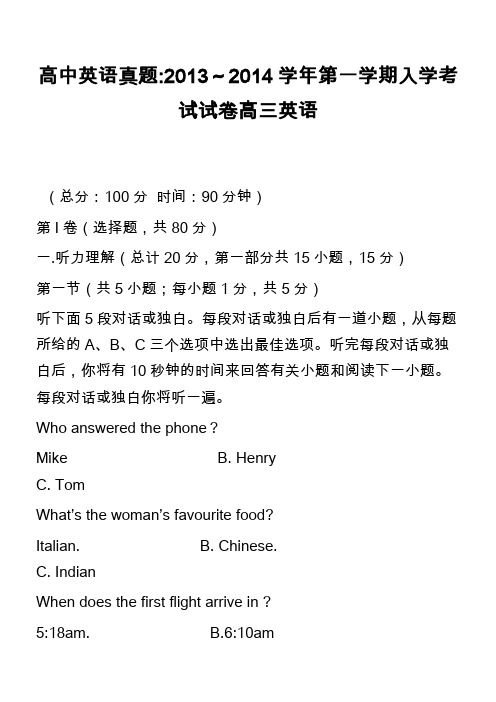
高中英语真题:2013~2014学年第一学期入学考试试卷高三英语(总分:100分时间:90分钟)第I卷(选择题,共80分)一.听力理解(总计20分,第一部分共15小题,15分)第一节(共5小题;每小题1分,共5分)听下面5段对话或独白。
每段对话或独白后有一道小题,从每题所给的A、B、C三个选项中选出最佳选项。
听完每段对话或独白后,你将有10秒钟的时间来回答有关小题和阅读下一小题。
每段对话或独白你将听一遍。
Who answered the phone?Mike B. HenryC. TomWhat’s the woman’s favourite food?Italian. B. Chinese.C. IndianWhen does the first flight arrive in ?5:18am. B.6:10amC.8:50amWhat is the woman looking for?Zoo B. TelephoneC. Tennis courtWhat will the weather be like at the weekend?Cloudy. B. Snowy.C. Sunny第二节(共10小题,每小题1分,共10分)听下面4段对话或独白,每段对话或独白后有几道小题,从每题所给的A、B、C三个选项中选出最佳选项。
听每段对话或独白前,你将有5秒钟的时间阅读每小题。
听完后,每小题将给出5秒钟的作答时间。
每段对话或独白你将听两遍。
听第6段材料,回答第6至7题。
Where are the two speakers?In the hotel B In a shopC. In a restaurantHow much did the man pay in the end?$115. B. $130C. $140听第7段材料,回答第8至9题。
What did the man do last weekend?Watched TV. B. Stayed at home.C. Visited a friendWhat will the woman probably do this weekend?Play tennis. B. Do some shoppingC. Go to a dance听第8段材料,回答第10至12题。
2014届高三英语第一学期期末试题人教版

襄阳市2013-2014学年普通高中调研统一测试高三英语(2013年12月)第一部分:听力(共两节,满分30分)回答听力部分时,请先将答案标在试卷上。
听力部分结束前,你将有两分钟的时间将你的答案转涂到客观题答题卡上。
第一节(共5小题;每小题1.5分,满分7.5分)听下面5段对话。
每段对话后有一个小题,从题中所给的A、B、C三个选项中选出最佳选项,并标在试卷的相应位置。
听完每段对话后,你都有10秒钟的时间来回答有关小题和阅读下一小题。
每段对话仅读一遍。
1.Where are they most probably talking ?A.In a phone box.B.In the office.C.At home.2.What does the man want to do ?A.To get a camera.B.To buy batteries.C.To go to the cinema.3.When will the man go to the cinema?A.On Sunday morning.B.On Sunday afternoon.C.On Sunday evening.4.What do you know from the man's replies?A.He lost Lily's book.B.He was badly pressed with his work.C.He was sure that the book could be found.5.What does the man like to collect?A.Coins.B.Magazines.C.Paintings.第二节(共15小题;每小题1.5分,满分22.5分)听下面5段对话或独白。
每段对话或独白后有几个小题,从题中所给的A、B、C三个选项中选出最佳选项,并标在试卷的相应位置。
听每段对话或独白前,你将有时间阅读各小题,每小题5秒钟;听完后,各小题将给出5秒钟的作答时间。
高中英语真题-2013—2014学年(上)高一级模块考试
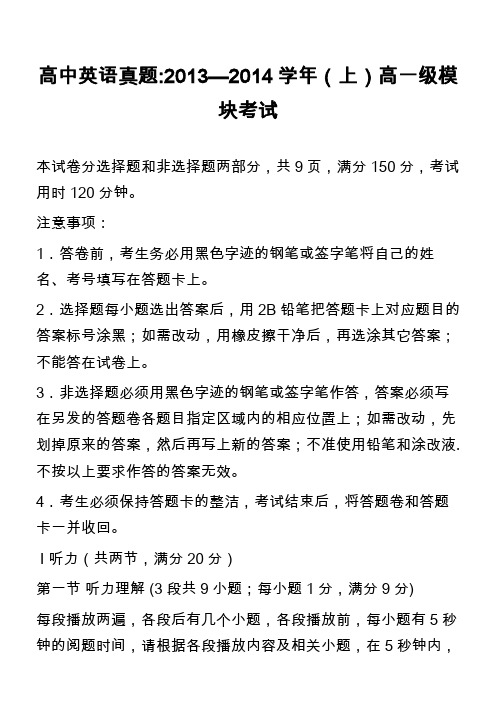
高中英语真题:2013—2014学年(上)高一级模块考试本试卷分选择题和非选择题两部分,共9页,满分150分,考试用时120分钟。
注意事项:1.答卷前,考生务必用黑色字迹的钢笔或签字笔将自己的姓名、考号填写在答题卡上。
2.选择题每小题选出答案后,用2B铅笔把答题卡上对应题目的答案标号涂黑;如需改动,用橡皮擦干净后,再选涂其它答案;不能答在试卷上。
3.非选择题必须用黑色字迹的钢笔或签字笔作答,答案必须写在另发的答题卷各题目指定区域内的相应位置上;如需改动,先划掉原来的答案,然后再写上新的答案;不准使用铅笔和涂改液.不按以上要求作答的答案无效。
4.考生必须保持答题卡的整洁,考试结束后,将答题卷和答题卡一并收回。
I 听力(共两节,满分20分)第一节听力理解 (3段共9小题;每小题1分,满分9分)每段播放两遍,各段后有几个小题,各段播放前,每小题有5秒钟的阅题时间,请根据各段播放内容及相关小题,在5秒钟内,从题中所给的A、B、C项中选出最佳选项并在答题卡上将该项涂黑。
听第一段对话,回答第1~3题。
1.Which of the following is true about the man?A.He never drinks wine. B.He dislikes hot food. C.He doesn't eat seafood.2.What dish does the man choose?A.Fish. B.Pork. C.Beef.3.Where will the man go after he has finished eating?A.Back to his work. B.For a rest.C.To his home.听第二段对话,回答第4—6题。
4.What do we know about the speakers?A.They live in .B.It is their first time in . C.They study in .5.How can the speakers get to the Tower of London from whe re they are?A.Go straight, turn right then walk ahead. B.Walk along the river then turn left.C.Walk to the river, turn left then go straight.6.How will the speakers tour around the city?A.On foot. B.By bicycle. C.By bus.听第三段独白,回答第7-9题。
高中英语真题-2013—2014学年度上学期第一次段考

高中英语真题:2013—2014学年度上学期第一次段考第一部分:听力(共两节,满分30分)第一节(共5小题;每小题1.5分,满分7.5分)听下面5段对话。
每段对话后有一小题,从题中所给的A、B、C三个选项中选出最佳选项,并标在试卷相应位置。
听完每段对话后,你都有10秒钟的时间回答有关小题和阅读下一小题。
每段对话仅读一遍。
1. Where did the conversation probably take place?A. On a train.B. In a kitchen.C. In a restauran t.2. When did Mary leave home?A. At 6:00.B. At 5:30.C. At 6:10.3. What does the man like about the magazine?A. The news.B. The film reviews.C. The food and drink section.4. What kind of soup did the speakers have for lunch?A. Tomato soup.B. Lemon and butter soup.C. Fish soup.5. Who likes poodles(狮子狗)?A. The woman.B. The man.C. The woman's mother.第二节(共15小题;每小题1.5分,满分22.5分)听下面5段对话或独白。
每段对话或独白后有几个小题,从题中所给的A、B、C三个选项中选出最佳选项,并标在试卷的相应位置。
听完每段对话或独白后,你将有时间阅读各个小题。
每小题5秒钟;听完后,每小题将给出5秒钟的作答时间。
每段对话或独白读两遍。
听第6段材料,回答第6至7题。
6. Why is the man driving fast?A. He woke up early.B. He is in a hurry.C. He likes d riving fast.7. What does the woman consider to be the cause of most acci dents?A. People who are drunk.B. People who are in a hurry.C. People who are careless.听第7段材料,回答第8至9题。
2013高三英语联考试卷
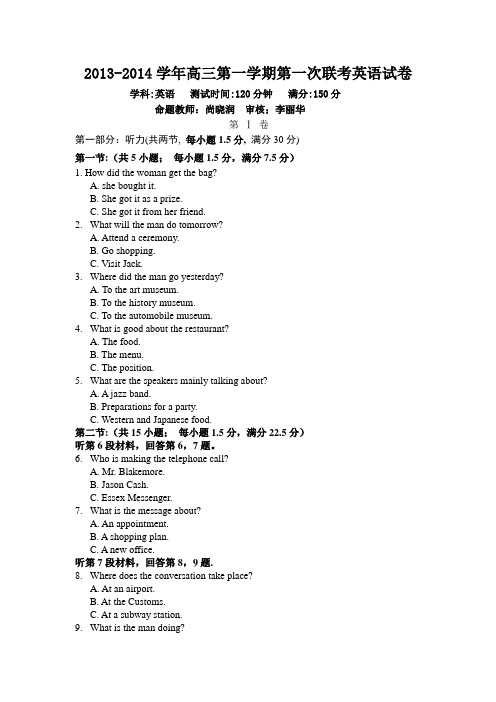
2013-2014学年高三第一学期第一次联考英语试卷学科:英语测试时间:120分钟满分:150分命题教师:尚晓润审核;李丽华第Ⅰ卷第一部分:听力(共两节, 每小题1.5分, 满分30分)第一节:(共5小题;每小题1.5分,满分7.5分)1. How did the woman get the bag?A. she bought it.B. She got it as a prize.C. She got it from her friend.2.What will the man do tomorrow?A. Attend a ceremony.B. Go shopping.C. Visit Jack.3.Where did the man go yesterday?A. To the art museum.B. To the history museum.C. To the automobile museum.4.What is good about the restaurant?A. The food.B. The menu.C. The position.5.What are the speakers mainly talking about?A. A jazz band.B. Preparations for a party.C. Western and Japanese food.第二节:(共15小题;每小题1.5分,满分22.5分)听第6段材料,回答第6,7题。
6.Who is making the telephone call?A. Mr. Blakemore.B. Jason Cash.C. Essex Messenger.7.What is the message about?A. An appointment.B. A shopping plan.C. A new office.听第7段材料,回答第8,9题.8.Where does the conversation take place?A. At an airport.B. At the Customs.C. At a subway station.9.What is the man doing?A. Handing in his knife.B. Buying a mobile phone.C. Passing the security check.听第8段材料,回答第10至12题。
2013—2014学年度第一学期期中考试高三英语试卷
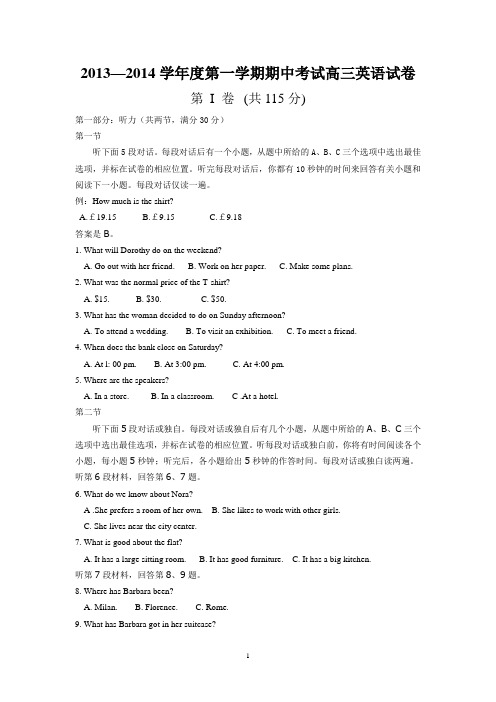
2013—2014学年度第一学期期中考试高三英语试卷第I 卷(共115分)第一部分:听力(共两节,满分30分)第一节听下面5段对话。
每段对话后有一个小题,从题中所给的A、B、C三个选项中选出最佳选项,并标在试卷的相应位置。
听完每段对话后,你都有10秒钟的时间来回答有关小题和阅读下一小题。
每段对话仅读一遍。
例:How much is the shirt?A.£19.15B.£9.15C.£9.18答案是B。
1. What will Dorothy do on the weekend?A. Go out with her friend.B. Work on her paper.C. Make some plans.2. What was the normal price of the T-shirt?A. $15.B. $30.C. $50.3. What has the woman decided to do on Sunday afternoon?A. To attend a wedding.B. To visit an exhibition.C. To meet a friend.4. When does the bank close on Saturday?A. At l: 00 pm.B. At 3:00 pm.C. At 4:00 pm.5. Where are the speakers?A. In a store.B. In a classroom. C .At a hotel.第二节听下面5段对话或独自。
每段对话或独自后有几个小题,从题中所给的A、B、C三个选项中选出最佳选项,并标在试卷的相应位置。
听每段对话或独白前,你将有时间阅读各个小题,每小题5秒钟;听完后,各小题给出5秒钟的作答时间。
每段对话或独白读两遍。
听第6段材料,回答第6、7题。
6. What do we know about Nora?A .She prefers a room of her own. B. She likes to work with other girls.C. She lives near the city center.7. What is good about the flat?A. It has a large sitting room.B. It has good furniture.C. It has a big kitchen.听第7段材料,回答第8、9题。
高中英语真题-2013-2014学年度第一学期
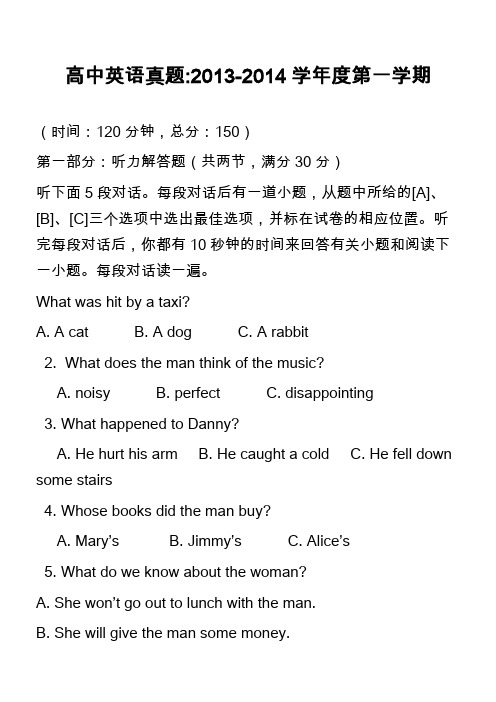
高中英语真题:2013-2014学年度第一学期(时间:120分钟,总分:150)第一部分:听力解答题(共两节,满分30分)听下面5段对话。
每段对话后有一道小题,从题中所给的[A]、[B]、[C]三个选项中选出最佳选项,并标在试卷的相应位置。
听完每段对话后,你都有10秒钟的时间来回答有关小题和阅读下一小题。
每段对话读一遍。
What was hit by a taxi?A. A catB. A dogC. A rabbit2. What does the man think of the music?A. noisyB. perfectC. disappointing3. What happened to Danny?A. He hurt his armB. He caught a coldC. He fell down some stairs4. Whose books did the man buy?A. Mary’sB. Jimmy’sC. Alice’s5. What do we know about the woman?A. She won’t go out to lunch with the man.B. She will give the man some money.C. She wants to buy the man a meal.第二节听下面5段对话或独白,每段对话和独白后有几个小题,从题中所给的A B C三个选项中选出最佳选项,并标在试卷的相应位置,听每段对话和独白前,你将有时间阅读各个小题,每小题5秒钟;听完后,各小题给出5秒钟的作答时间。
每段对话和独白读两遍。
听第6段材料,回答第6、7题。
6. What was the weather like yesterday?A. sunnyB. rainyC. windy7. What is the man going to do?A. Prepare some food.B. Get the tent ready.C. Get the bikes ready.听第7段材料,回答第8、9题8. Where are the speakers?A. in a shopB. at homeC. in the street9. What does the woman think of the carrots?A. They are fresh.B. They are too old.C. They can make a great dessert.听第8段材料,回答第10至12题10. What is true about the library?A. newspapers can be taken out.B. It is open from 8: 00 a.m. to 10:00p.m.C. Magazines are on the second floor.听第9段材料,回答第13至16题.13. Who is the woman?A. The man’s auntB. The man’s sisterC. The man’s m other14. When did the man last eat?A. one hour ago.B. Two hours agoC. Three hours ago.15. What does the man think of iPads?A. They are useless to herB. They are easy to use.C. They’re too difficult for her16. What can we learn from the woman?A. She knows little about SkypeB. She has never surfed the InternetC. She uses computers a lot for her work.听第10段材料,回答第17至20题.17. What about is mentioned in the talk?A. There is lots of snow.B. It can be rainy for a whole day.C. The weather changes a lot during the day.18. When do shops close on weekends?A. 5:30p.mB. 5:00p.mC. 4:30p.m19. Where can people go at any time?A. banksB. parksC. museums20. Which kind of transportation is discussed in detail?A. trainB. taxiC. Bus第二部分英语知识运用(共两节,满分35分)第一节:单项填空(共15小题;每小题1分,满分15 分)从A、B、C、D四个选项中,选出可以填入空白处的最佳选项。
2013-2014学年度高三复习阶段性检测 英语试题
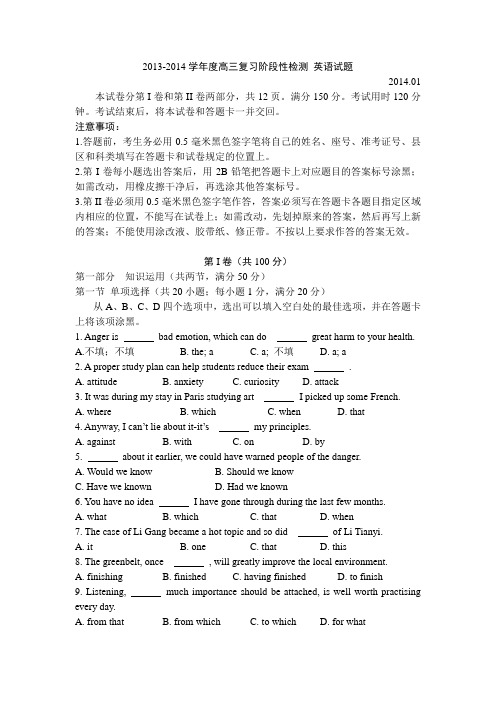
2013-2014学年度高三复习阶段性检测英语试题2014.01 本试卷分第I卷和第II卷两部分,共12页。
满分150分。
考试用时120分钟。
考试结束后,将本试卷和答题卡一并交回。
注意事项:1.答题前,考生务必用0.5毫米黑色签字笔将自己的姓名、座号、准考证号、县区和科类填写在答题卡和试卷规定的位置上。
2.第I卷每小题选出答案后,用2B铅笔把答题卡上对应题目的答案标号涂黑;如需改动,用橡皮擦干净后,再选涂其他答案标号。
3.第II卷必须用0.5毫米黑色签字笔作答,答案必须写在答题卡各题目指定区域内相应的位置,不能写在试卷上;如需改动,先划掉原来的答案,然后再写上新的答案;不能使用涂改液、胶带纸、修正带。
不按以上要求作答的答案无效。
第I卷(共100分)第一部分知识运用(共两节,满分50分)第一节单项选择(共20小题;每小题1分,满分20分)从A、B、C、D四个选项中,选出可以填入空白处的最佳选项,并在答题卡上将该项涂黑。
1. Anger is bad emotion, which can do great harm to your health.A.不填;不填B. the; aC. a; 不填D. a; a2. A proper study plan can help students reduce their exam .A. attitudeB. anxietyC. curiosityD. attack3. It was during my stay in Paris studying art I picked up some French.A. whereB. whichC. whenD. that4. Anyway, I can‟t lie about it-it‟s my principles.A. againstB. withC. onD. by5. about it earlier, we could have warned people of the danger.A. Would we knowB. Should we knowC. Have we knownD. Had we known6. You have no idea I have gone through during the last few months.A. whatB. whichC. thatD. when7. The case of Li Gang became a hot topic and so did of Li Tianyi.A. itB. oneC. thatD. this8. The greenbelt, once , will greatly improve the local environment.A. finishingB. finishedC. having finishedD. to finish9. Listening, much importance should be attached, is well worth practising every day.A. from thatB. from whichC. to whichD. for what10. Take the umbrella with you in case it .A. may rainB. will rainC. rainedD. rains11. The alarm clock has stopped. I get it to go again or I might be late tomorrow.A. canB. mustC. couldD. may12. the feelings of the neighbouring nations, the Japanese prime minister visited Yasukuni shrine(靖国神灶).A. Apart fromB. In addition toC. But forD. Regardless of13. Jennifer will stop dinner, so she won‟t be here very soon.A. to haveB. havingC. having hadD. to have had14. In China you can see people using mobile phones while driving, is illegal in many other countries.A. whereB. whenC. whichD. who15.-Do you like my new shoes? They cost only £15.- Wow! That‟s cheap, what a !A. gainB. profitC. bargainD. win16.- You seem to be familiar with this city.- I here for three years. It‟s great to be back for a visit.A. livedB. have livedC. had livedD. live17. There is always a debate on human beings are born good or bad.A. whichB. whatC. thatD. whether18. It was of you not to disturb the Senior Three students at night.A. considerateB. patientC. convenientD. modest19. I remembered that the air conditioners turned off before I left office.A. wereB. had beenC. were to beD. have been20. -Here you are at the railway station.- ! I‟ve forgotten the ticket!A. So soonB. All rightC. Oh noD. Well done第二节完形填空,(共20小题;每小题1.5分,满分30分)阅读下面短文,从短文后各题所给的四个选项(A、B、C和D)中选出可以填入空白处的最佳选项,并在答题卡上将该项涂黑。
【新课标版】2014届高三上学期第一次月考 英语 含答案
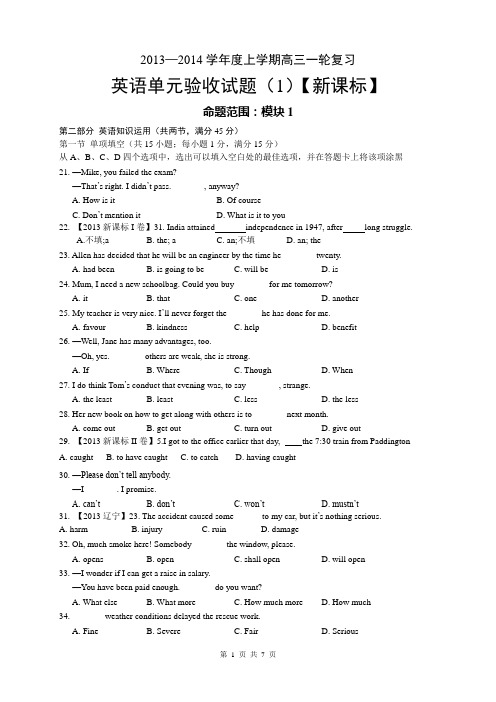
2013—2014学年度上学期高三一轮复习英语单元验收试题(1)【新课标】命题范围:模块1第二部分英语知识运用(共两节,满分45分)第一节单项填空(共15小题;每小题1分,满分15分)从A、B、C、D四个选项中,选出可以填入空白处的最佳选项,并在答题卡上将该项涂黑21. —Mike, you failed the exam?—That’s right. I didn’t pass. _______, anyway?A. How is itB. Of courseC. Don’t mention itD. What is it to you22. 【2013新课标I卷】31. India attained independence in 1947, after long struggle.A.不填;aB. the; aC. an;不填D. an; the23. Allen has decided that he will be an engineer by the time he _______ twenty.A. had beenB. is going to beC. will beD. is24. Mum, I need a new schoolbag. Could you buy _______ for me tomorrow?A. itB. thatC. oneD. another25. My teacher is very nice. I’ll never forget the _______ he has done for me.A. favourB. kindnessC. helpD. benefit26. —Well, Jane has many advantages, too.—Oh, yes. _______ others are weak, she is strong.A. IfB. WhereC. ThoughD. When27. I do think Tom’s conduct that evening was, to say _______, strange.A. the leastB. leastC. lessD. the less28. Her new book on how to get along with others is to _______ next month.A. come outB. get outC. turn outD. give out29. 【2013新课标II卷】5.I got to the office earlier that day, the 7:30 train from PaddingtonA. caughtB. to have caughtC. to catchD. having caught30. —Please don’t tell anybody.—I _______. I promise.A. can’tB. don’tC. won’tD. mustn’t31.【2013辽宁】23. The accident caused some______ to my car, but it’s nothing serious.A. harmB. injuryC. ruinD. damage32. Oh, much smoke here! Somebody _______ the window, please.A. opensB. openC. shall openD. will open33. —I wonder if I can get a raise in salary.—You have been paid enough. _______ do you want?A. What elseB. What moreC. How much moreD. How much34. _______ weather conditions delayed the rescue work.A. FineB. SevereC. FairD. Serious35. 【2013新课标II卷】15. -Are you sure you won't come for a drink with us?- , if you insistA. Not at allB. It dependsC. All right thenD.I don't care第二节完形填空(共20小题;每小题1.5分,满分30分)阅读下面短文,从短文后各题所给的四个选项(A、B、C和D)中,选出可以填入空白处的最佳选项,并在答题卡上将该项涂黑。
高中英语真题-2013-2014学年度第一学期段一考试
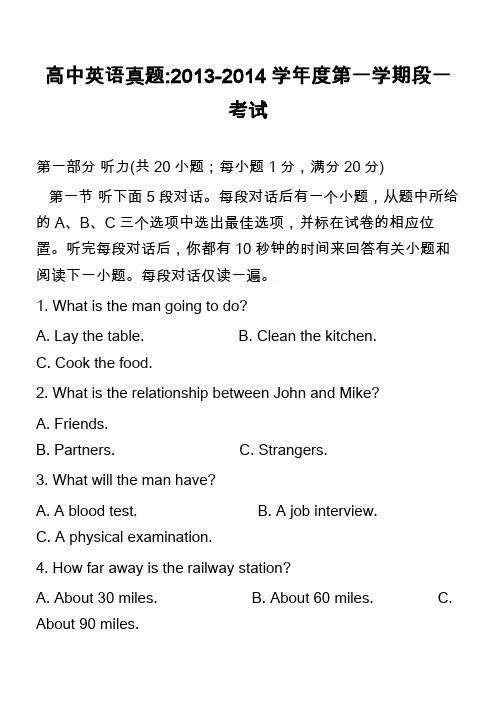
高中英语真题:2013-2014学年度第一学期段一考试第一部分听力(共20小题;每小题1分,满分20分)第一节听下面5段对话。
每段对话后有一个小题,从题中所给的A、B、C三个选项中选出最佳选项,并标在试卷的相应位置。
听完每段对话后,你都有10秒钟的时间来回答有关小题和阅读下一小题。
每段对话仅读一遍。
1. What is the man going to do?A. Lay the table.B. Clean the kitchen.C. Cook the food.2. What is the relationship between John and Mike?A. Friends.B. Partners.C. Strangers.3. What will the man have?A. A blood test.B. A job interview.C. A physical examination.4. How far away is the railway station?A. About 30 miles.B. About 60 miles.C. About 90 miles.5. Where might the conversation take place?A. On a bus.B. In a store.C. At a hotel.第二节听下面5段对话或独白。
每段对话或独白后有几个小题,从每题所给的A、B、C三个选项中选出最佳选项,并标在试卷的相应位置。
听每段对话或独白前,你将有时间阅读各个小题,每小题5秒钟;听完后,各小题将给出5秒钟的作答时间。
每段对话或独白读两遍。
听第6段材料,回答第6至第8题。
6. When will the boys’ dormitory be cleaned?A. Right now.B. After school.C. Tomorrow afternoon.7. Why are the boys going to clean the dormitory?A. Some parents will be there.B. It is bad for their health.C. There is a bad smell there.8. What is the woman’s reaction to the boys’ cleaning?A. Showing surprise.B. Offering help.C. Trying to stand it.听第7段材料,回答第9、10题。
高中英语真题-2013-2014学年度上学期第一次段考
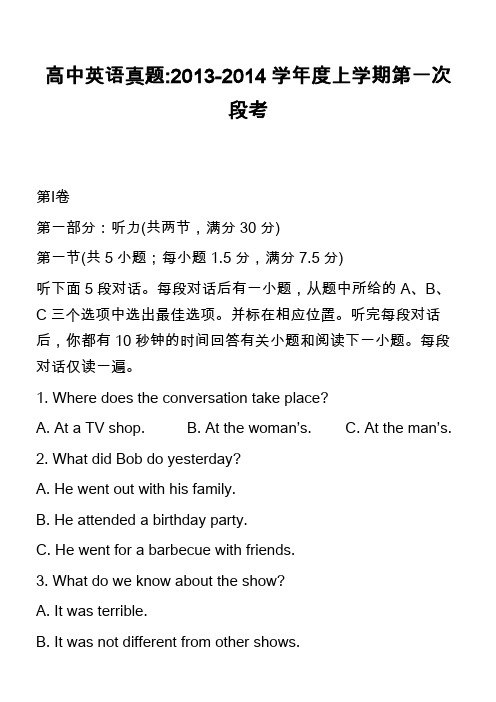
高中英语真题:2013-2014学年度上学期第一次段考第Ⅰ卷第一部分:听力(共两节,满分30分)第一节(共5小题;每小题1.5分,满分7.5分)听下面5段对话。
每段对话后有一小题,从题中所给的A、B、C三个选项中选出最佳选项。
并标在相应位置。
听完每段对话后,你都有10秒钟的时间回答有关小题和阅读下一小题。
每段对话仅读一遍。
1. Where does the conversation take place?A. At a TV shop.B. At the wo man’s.C. At the man’s.2. What did Bob do yesterday?A. He went out with his family.B. He attended a birthday party.C. He went for a barbecue with friends.3. What do we know about the show?A. It was terrible.B. It was not different from other shows.C. It was a festival show.4. What does the woman mean?A. The man should start running daily.B. It’s important to warm up before exercising.C. The man should continue his exercise program.5. When must the book reports be handed in?A. Not later that November 13.B. Not earlier than November 13.C. On November 30.第二节(共15小题;每小题1.5分,满分22.5分)听下面5段对话或独白。
- 1、下载文档前请自行甄别文档内容的完整性,平台不提供额外的编辑、内容补充、找答案等附加服务。
- 2、"仅部分预览"的文档,不可在线预览部分如存在完整性等问题,可反馈申请退款(可完整预览的文档不适用该条件!)。
- 3、如文档侵犯您的权益,请联系客服反馈,我们会尽快为您处理(人工客服工作时间:9:00-18:30)。
2013—2014学年度第一学期第一学段模块考试高三英语试题2013.11 本试题分第Ⅰ卷和第Ⅱ卷两部分,共9 页。
第Ⅰ卷为选择题,105 分,第Ⅱ卷为非选择题,45分,满分150 分。
考试时间120 分钟。
考试结束后,将答题卡与答题纸交回。
注意事项:1.答卷前,考生务必将自己的姓名、考号、考试科目填涂在答题卡规定的位置上。
2.第Ⅰ卷每题选出答案后,必须用2B铅笔把答题卡上对应题目的答案标号[ABCD]涂黑,如需改动,必须用橡皮擦干净,再改涂其它答案标号。
答案不能答在试题卷上。
3.第Ⅱ卷的答案必须写在答题纸各题目指定区域内相应的位置,不能写在试题卷上。
第Ⅰ卷(选择题 105分)英语知识运用(共两节,满分55分)第一节:单项填空(共25小题;每小题1分,满分25分)从A、B、C、D 四个选项中,选出可以填入空白处的最佳选项,并在答题卡上将该项涂黑。
1. With ______ help of his English teacher, he has made _____ great progress in English this term.A. the ; aB. the ; theC. the ; /D. a ; /2. The new book _____ a history of more than 3,000 years will be published next week.A. spreadingB. holdingC. includingD. covering3. Peter's jacket looked just the same as Jack's,but it cost _____ his.A. as much twice asB. twice as much asC. much as twice asD. as twice much as4. No sooner _____ the job ____ he rose to his feet, satisfied and relaxed.A. He had finished; whenB. he finished; thanC. did he finished; whenD. had he finished; than5. The church clock _______ eleven when I reached the village.A. struckB. beatC. strikesD. hit6. _______ the city centre, we saw a stone statue of about 10 meters in height.A. ApproachingB. ApproachedC. To approachD. To be approached7. In my opinion, learning is lifelong and the more knowledge you get, ________________.A. the more for life are you equippedB. the more equipped for life you areC. the more life you are equipped forD. you are equipped the more life8. The driving test was difficult to pass. As a result, ____ people failed it. Which of the following answer is wrong?A. a great manyB. a large number ofC. a great deal ofD. plenty of9. --- What was the party like? --- Wonderful. It is years ______ I enjoyed myself so much.A. afterB. whenC. beforeD. since10. The Group ______ the eight richest countries in the world signed a contract last week.A. consists ofB. is made up ofC. consisting ofD. composing of11. The president of the university demanded that the problems _____ paid special attention to .A. referred to beingB. referred to beC. refer to beingD. refer to be12. It is surprising that ______ little insects like ants can cause ______ much damage to the building. .A. So; suchB. Such; soC. So; soD. Such; such13. .--- Your brother had a good time at the dancing party. --- _______ , and _______.A. So he had ; so did IB. So had he; so I didC. So he did ; so did ID. So did he; so I did14. I‟d rather you ________ this matter to anyone else and I will tell you more about it.A. not to mentionB. not mentionC. will not mentionD. didn‟t mention15. The Red Army overcame many difficulties during the Long March(长征), _____ the snow mountain,______ the river and ______the forest.A. over; through; acrossB. over; across; throughC. across; through; overD. across; over; through16. There was a sudden gust of wind and ______.A. went away his hatB. went his hat awayC. away went his hatD. away his hat went17. Great efforts have been ____to improve people‟s living conditions in China in the past two years.A. madeB. wonC. gotD. did18. —Is there any ______ he will be elected monitor? —It‟s hard to say.A. chance whetherB. possibility thatC. doubt ifD. question that19. What _____ to the shop owner when the fire ____?A. happened; broke outB. took place; went outC. happened; was taking placeD. took place; put out20. Hearing the news, he ran out of the room in a hurry, ______ the meal ______.A. to leave; untouchingB. left; untouchedC. leaving; untouchedD. leaving; untouching21. This conference was of _____ to us, so we took no interest in it.A. great importanceB. no importanceC. importantD. not important22. My ink ______. Can you lend me some ink?A. used upB. has run out ofC. has used up D has run out23. If we work with a strong will, we can overcome any difficulty, ________great it is.A. whateverB. howeverC. whereverD. whenever24. Don‟t forget to phone me, _______?A. do youB. needn‟t youC. won‟t youD. will you25. It‟s no use _________ with him. He won‟t change his mind.A. arguingB. to argueC. argueD. argued第二节完形填空(共20小题;每小题1.5分,满分30分)阅读下面短文,从短文后各题所给的四个选项(A、B、C和D)中,选出可以填入空白处的最佳选项, 并在答题卡上将该项涂黑。
Streit was an experienced safecracker who never used force — either against people or safes. He was a real 36 of his trade and it took him only 19 minutes to open the most difficult 37 he had ever met. In about 10 years, 38 by his brother Stefan, he took about €33,000,000 —from the safes of 28 banks in Austria. On his last job, he 39 the safe door open and €80,000 behind. With the40 was a note, ''We don't need all that much''. A witness 41 his car and Streit was caught by the police. Then he was sent to Austria's Stein Prison to serve a six-year 42 . He boasted (吹嘘) at his trial that he would continue 43 the law, ''I'm a thief and I shall use every opportunity.'' In spite of the 44 , prison officials moved Streit to the prison's blacksmith shop. One day during the week before Christmas, Streit 45 . Searchers found all his doors were well locked. Streit had 46 to make a set of keys and let himself out. Not to 47 , though. After crossing into Bavaria, Streit 48 the suspicion (怀疑) of German customs police on purpose and got himself 49 . ''I want to be in aGerman prison, ''he 50 to the surprised police. ''As German courts give much milder (温和的) sentences for 51 like mine and will 52 the time I would otherwise have served in Stein Prison.'' In prison, Streit 53 his keepers to let him telephone his former keeper, Karl Schreiner of Stein Prison. ''I'm sorry 54 I caused trouble. I didn't want to 55 anybody by escaping. Conditions weren't that bad. In fact the food was better than it is here.''36. A. dancer B. artist C. composer D. musician37. A. safe B. bank C. prison D. door38. A. offered B. trained C. respected D. helped39. A. made B. broke C. left D. removed40. A. safe B. money C. door D. job41. A. rode B. stole C. broke D. recognized42. A. sentence B. holiday C. freedom D. treatment43. A. obeying B. respecting C. breaking D. destroying44. A. sentence B. warning C. trial D. suggestion45. A. survived B. starved C. disappeared D. worked46. A. tried B. decided C. expected D. managed47. A. safety B. prison C. hometown D. freedom48. A. offered B. attracted C. removed D. admitted49. A. arrested B. relaxed C. recognized D. encouraged50. A. went B. lied C. explained D. negotiated51. A. mistakes B. robbery C. money D. crimes52. A. multiply B. reduce C. add D. lose53. A. cheated B. expected C. persuaded D. helped54. A. if B. but C. for D. though55. A. injure B. steal C. accuse D. embarrass第三部分:阅读理解(共20小题;每小题2.5分,满分50分)阅读下列短文,从每题所给的四个选项(A、B、C、D)中选最出佳选项并在答题卡上将其涂黑。
